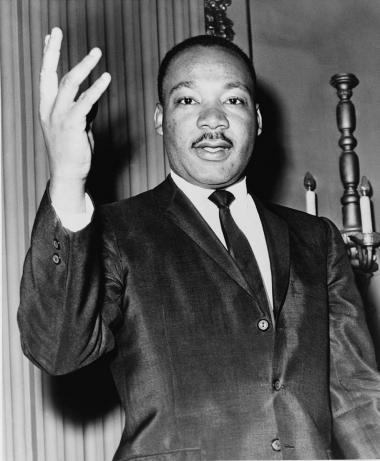
Dr. Martin Luther King, Jr. (1929–1968), was the youngest person (age thirty-five) to win the Nobel Prize for Peace (1964). While a Baptist minister in Montgomery, Alabama, he led the successful bus boycott that ushered in the American civil rights movement and led to the passage of the Civil Rights Amendment. Inspired by his Christian faith and the principles of Indian statesman Mahatma Ghandi, he adopted a program of nonviolent protest, civil disobedience, and Christian love. In 1957, he was elected president of the Southern Christian Leadership Conference and, in 1963, during the time of peaceful protests in Birmingham, Alabama, which resulted in televised police brutality against the protestors, he wrote "Letter from a Birmingham Jail," a manifesto of his philosophy and tactics that remains required reading in universities throughout the world today. Later in 1963, before 200,000 people who participated in the massive March on Washington, he delivered his “I Have a Dream” speech, which defined the moral basis of the civil rights movement. In 1964, his acceptance speech for the Nobel Prize for Peace included these often-quoted words: “I believe that unarmed truth and unconditional love will have the final word in reality. This is why right temporarily defeated is stronger than evil triumphant.” He asked to be remembered as a “drum major for justice,” and his dream for racial equality continues in spite of his untimely assassination on April 4, 1968. He is the only non-president with a national holiday (the third Monday in January) that honors his life and teachings, and he is the only non-president whose likeness stands as a memorial on the National Mall in Washington, D.C.
Born Michael King, Jr., on January 15, 1929, in Atlanta, Georgia, he and his father both later changed the Michael portion of their names to Martin Luther to honor the German Protestant religious reformer. He graduated from high school at age 15 and subsequently received a bachelor's degree in sociology from Morehouse College, graduated with a bachelor of divinity from Crozer Theological School, and earned a doctorate in systematic theology from Boston University. His writings have been compiled in several books: Strength To Love (1963), Why We Can't Wait (1963, 1964), Where Do We Go From Here: Chaos or Community? (1968), A Testament of Hope: The Essential Writings and Speeches of Martin Luther King, Jr. (1986), The Autobiography of Martin Luther King, Jr. (1998).








